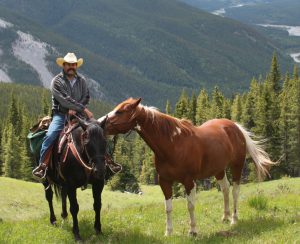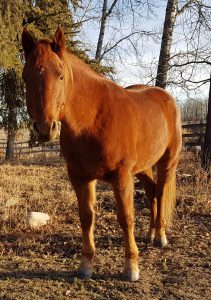If you haven’t read part one of this article series, click here and read it first.
No one is born with an understanding of the horse. Many of us were taught, “squeeze go to, pull one rein to turn and both to stop”. We were never required to take a course on how horses think or how their bodies work. I’ve come to realize that those are the most important parts of riding, because once we have that understanding, everything horses do makes complete sense. And when they make sense, we can work with them in a supportive way; not a punitive way. I’m happy to say we can advance our riding skills exponentially by learning a few subtle things. And, like horses, humans are also able to change the way we handle pressure and frustration.

I believe that horsemanship is a small amount of horse knowledge, a desire to learn and a whole lot of selfmanship.
– Scott Phillips
Here is a little selfmanship test for you:
If you were having a conversation with another person and they disagreed with you, what would you do?
Some of us will start getting tense right way and while the other person is speaking we’re formulating a defense of our own opinion. Some of us will cut the other person off because we’re offended. Some of us will pause, realize that the other person believes in their ideas just as strongly as we believe in ours. Some of us will really listen and try to understand. Some will leave the conversation. Some of us will instantly agree with the other person for fear of offending them.
Think about what you would do.
Your answer is important. How you handle differences in opinion is your personal style; you’ll apply it all the time – when talking to customers, working with horses and practically everywhere else. If you choose to be offended or become defensive with a person – or if you always defer to the opinion of others, you will likely do the same with a horse. This is because over time, we program ourselves to respond the same way when similar situations present themselves.
Taking offense is actually something you can be chemically addicted to. So is assigning blame (to yourself or others) or feeling sorry for yourself. In your brain, this is similar to a “thrill-seeking rush”. When we are about to experience pleasure or thrill, dopamine is released in the brain. This tells your brain, “Hey, get ready, this is about to be good!” What actually causes the pleasure is another process, but that’s out of the scope of this discussion. All we need to understand is that it’s easy to program our brain for a chemical high when we are feeling sorry for ourselves, acting in anger or becoming defensive. Think about this: have you ever knowingly told a lie? Don’t lie here! Remember that feeling you get – it is a chemical high – it’s a rush: “Am I you going to get away with it?” And it is addictive.
Lets put this into a practical perspective and find a solution. Here is the scenario: you are accompanying your friend to the dealer to look at new trucks.
Your friend says, “Wow – I LOVE the look of these new 2020’s!”
 You don’t love the new trucks – you have a 2015 that you think looks better – and can’t help feeling that your friend has just insulted your truck. So what do you do? You’ll feel that dopamine trigger coming on. It’s what precipitates that rush. Now here is a GREAT opportunity to practice your horsemanship; your selfmanship. Break that pattern. Stop the rush by taking a deep breath. Smile and refocus. Now, as hard as this might be, LISTEN TO, ACKNOWLEDGE and VALIDATE what your friend said. You don’t have to agree to do this.
You don’t love the new trucks – you have a 2015 that you think looks better – and can’t help feeling that your friend has just insulted your truck. So what do you do? You’ll feel that dopamine trigger coming on. It’s what precipitates that rush. Now here is a GREAT opportunity to practice your horsemanship; your selfmanship. Break that pattern. Stop the rush by taking a deep breath. Smile and refocus. Now, as hard as this might be, LISTEN TO, ACKNOWLEDGE and VALIDATE what your friend said. You don’t have to agree to do this.
You’ll find when you do this, you’ll also get that chemical response. You’ll feel good about what you said and how it positively affected your friend. With practice your response will change without you thinking about it. And you will become a better leader, a more trusted friend…a better horseperson.
You could try saying, “You have a great point! They sure have made some big changes!” It’s not our job to convince other people of our opinions. Your friends already know what you think. Acknowledge their opinion, validate it, but don’t argue.
Practice this. Don’t shy away from situations that might make you angry or opinionated. Instead, seek them. Practice asking others for their opinion, acknowledging and validating. Outside of our horse lives, we are presented with daily opportunities to practice “selfmanship”. Go for it.
Do you see where this relates to horse riding yet?
 Back to our original example. If you have provided an energetic directional focus for your horse (see this article for information on FOCUS) and your horse is indicating an opposing or different idea – but has not yet taken action – then the following is true:
Back to our original example. If you have provided an energetic directional focus for your horse (see this article for information on FOCUS) and your horse is indicating an opposing or different idea – but has not yet taken action – then the following is true:
- Your horse knows what direction you are asking well before you consider the rein as an option.
- There is a pressure drawing your horse to the right. This could be a number of things from a desire to get back to the gate ‘because that’s where we stop’ or a buddy calling, etc.
- Your horse is in a position to choose one of two options: follow you OR follow their own thought.
We know that the horse’s mind has a singular focus and that focus will be on the highest pressure at any given moment. So who is right? How are you going to get your horse to turn to the left without an argument? I’ve given lots of hints so far. Have you figured out the solution?
Stay tuned for Part III
Scott Phillips
May 2018
